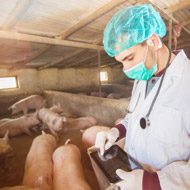
Figures show an increase in serious illness
The National Pig Association (NPA) has responded to media reports on the link between pork products and hepatitis E in humans.
According to The Sunday Times, thousands of Britons are being infected with the virus through pork products mostly imported from Europe.
The report states that the strain of hepatitis E - linked to pig farms in France, Holland, Germany and Denmark - is infecting more than 60,000 people in the UK every year.
While most cases are not serious, figures from Public Health England (PHE) show an increase in serious illness, from 368 in 2010 to 1,244 in 2016. Those most at risk are transplant patient and pregnant women.
The Sunday Times report refers to a study that shows that the virus had spread to over 90 per cent of British pigs. It also made reference to studies suggesting that 10 per cent of sausages could be affected.
In its response, the NPA said that pigs are a natural reservoir for HEV and infection is present in pig populations across the world.
Samples collected in 2013 found the virus in 129 out of 629 (20.5 per cent) of UK pigs, it states. Ninety-three per cent tested positive for HEV antibiotics, suggesting exposure at some point in their life.
High presence of the virus to a level that could be infectious to humans was only found in six of the 629 pigs samples.
‘Research at Public Health England has shown that the subgroup of hepatitis E causing the majority of human infection in the UK is not the same as the subgroup found in UK pigs,’ said an NPA spokesperson.
‘The NPA agrees agrees with the conclusion of the researchers that if people in this country have contracted hepatitis E virus from eating pork, it is likely to have come from imported pork, rather than British pork.’
The NPA also urged caution on the claim that 10 per cent of sausages could be infected.
‘This finding was from a limited sample size of 63 sausages from 11 batches. While six sausages tested positive for HEV, five of these were from the same batch. The origin of the sausages was not known,’ they write.
‘In the UK, sausages with the Red Tractor logo are not permitted to include liver or offal, reducing the risk of contamination compared with countries where liver and blood sausage are popular.’
The NPA recommends that consumers follow the advice from the Food Standards Agency, that pork and sausages should be cooked thoroughly until steaming hot throughout, with no pink in the centre.



 The latest
The latest